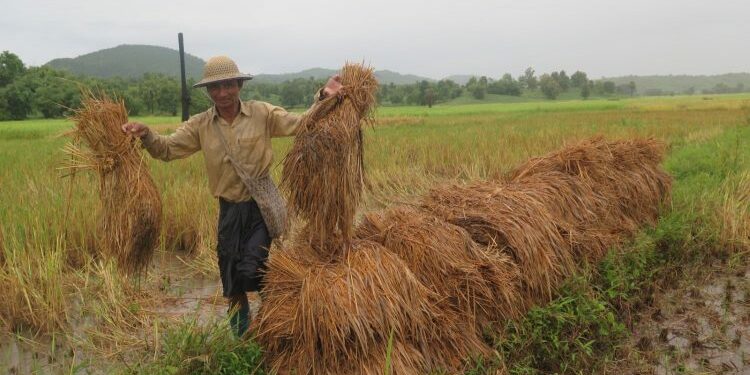Myanmar’s farmers are making losses as the prices of fertilizers and other agricultural inputs have doubled during the monsoon season amid ongoing turmoil under military rule.
A sack of fertilizer has jumped from 25,000 kyats (US$13) to 70,000 kyats and it costs more than 60,000 kyats to harvest an acre (0.4 hectares) as fuel prices have significantly increased, said a farmer from Kayan Township in Yangon Region, who did not want to be named.
Price hikes have forced many paddy farmers to use less fertilizer, which will directly affect the harvest, he said.
“Previously, we could buy goods on credit. But sellers can’t give credit now so we can’t fertilize our farms,” he said.
The military regime on Wednesday fixed a minimum or floor price for rice at 540,000 kyats for 100 baskets of paddy (the regime set one basket at 21kg, however on the market, it is around 22-23kg) for monsoon paddy this year and hot-season paddy next year.
A regime statement said the market can exceed the floor price but not fall below it.
Monsoon paddy harvest is just beginning and prices will depend on the merchants. Only when the rice fetches 700,000 kyats per 100 baskets at market can they have a profit of 70,000 kyats to 100,000 kyats, said farmers.
It costs more than 400,000 kyats per acre with an estimated harvest of 70 baskets, according to farmers. And the yield will decline with the limited use of fertilizer.
Rice prices are 500,000-600,000 kyats per 100 baskets in Myanmar. Current prices are only covering most farmers’ costs. Farmers in remote locations are making losses after earning only around 500,000 kyats after transport costs are paid to merchants.
If price hikes continue, it will be difficult for farmers to grow paddy in the coming hot season when there will be no rain and farmers rely on wells and irrigation, they said.
“Fuel prices have increased so the harvest may decline in farms that have to pump from wells in the hot season,” an Ayeyarwady Region farmer told The Irrawaddy.
Even in Ayeyarwady Region, farmers in Zalun, Danubyu, Kyonpyaw, Pantanaw and other townships have to use wells during the hot season, meaning the area being cultivated might decline, he said.
“Given the fertilizer and other prices, it will be hard for farmers to grow hot-season paddy,” said the Kayan Township farmer.
While the minimum price was set at 520,000 kyats per 100 baskets of paddy last year, fixing the price at 540,000 kyats this year will not help farmers, considering the current situation. Given the fixed prices, farmers who borrowed money from lenders or pawned their belongings to grow paddy will be forced to abandon their livelihoods, said Pakokku University Students Union.
You may also like these stories:
Myanmar Junta Launches New Coastguard
Hundreds of Myanmar Junta Informants Killed or Wounded
Myanmar Military Detains North Western Commander for Planning to Defect: Ethnic Insurgent Sources

















